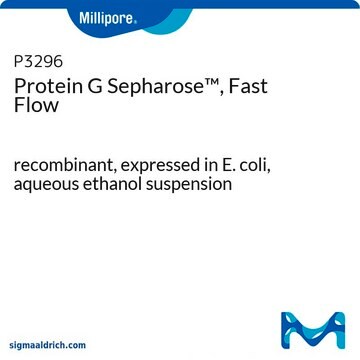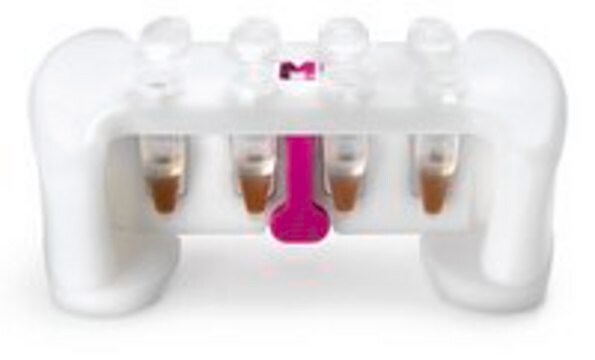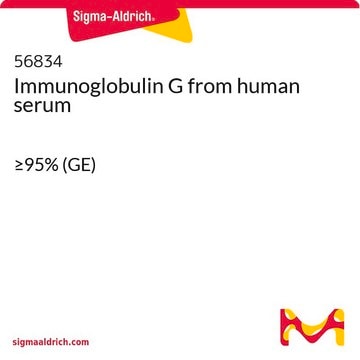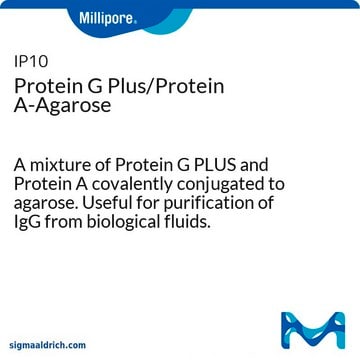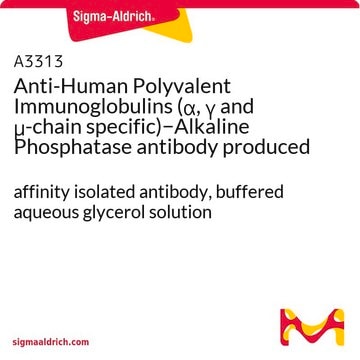IP50
Protein G Immunoprecipitation Kit
sufficient for 50 assays
Synonym(s):
Immunoprecipitation kit
Sign Into View Organizational & Contract Pricing
All Photos(1)
About This Item
UNSPSC Code:
12352203
NACRES:
NA.32
Recommended Products
usage
sufficient for 50 assays
technique(s)
immunoprecipitation (IP): suitable
storage temp.
2-8°C
Related Categories
Application
The kit is designed to allow maximal recovery of immunoprecipitates. It provides all the necessary reagents to perform immunoprecipitation from cell extracts of any protein to which a suitable antibody is available. Based on protein G, the kit binds to most commonly used antibodies. In addition, spin columns are provided to enable quick washes without the loss of protein G resin and thus protein yield is maximized.
Features and Benefits
- Minimal loss of antigen-antibody bound beads during washing.
- Minimal or no non-specific signals by increasing the stringency of the washing step.
Preparation Note
When preparing reagents, use ultrapure water (17M -cm)
related product
Product No.
Description
Pricing
Signal Word
Warning
Hazard Statements
Precautionary Statements
Hazard Classifications
Eye Irrit. 2 - Flam. Liq. 3 - Skin Irrit. 2
Storage Class Code
3 - Flammable liquids
WGK
WGK 3
Certificates of Analysis (COA)
Search for Certificates of Analysis (COA) by entering the products Lot/Batch Number. Lot and Batch Numbers can be found on a product’s label following the words ‘Lot’ or ‘Batch’.
Already Own This Product?
Find documentation for the products that you have recently purchased in the Document Library.
Customers Also Viewed
Patricia Workman et al.
Journal of bacteriology, 194(13), 3512-3521 (2012-05-01)
The BamA protein of Escherichia coli plays a central role in the assembly of β-barrel outer membrane proteins (OMPs). The C-terminal domain of BamA folds into an integral outer membrane β-barrel, and the N terminus forms a periplasmic polypeptide transport-associated
R Meller et al.
Cell death and differentiation, 10(5), 539-547 (2003-05-03)
Seizure-induced neuronal death may involve engagement of the BCL-2 family of apoptosis-regulating proteins. In the present study we examined the activation of proapoptotic BAD in cultured hippocampal neurons following seizures induced by removal of chronic glutamatergic transmission blockade. Kynurenic acid
F Gautier et al.
Molecular and cellular biology, 31(4), 832-844 (2010-12-22)
Bcl-2 homologues (such as Bcl-x(L)) promote survival in part through sequestration of "activator" BH3-only proteins (such as Puma), preventing them from directly activating Bax. It is thus assumed that inhibition of interactions between activators and Bcl-x(L) is a prerequisite for
Hubert Arokium et al.
The Journal of biological chemistry, 282(48), 35104-35112 (2007-10-04)
During apoptosis, the pro-apoptotic protein Bax relocalizes from the cytosol to the mitochondrial outer membrane. This relocalization is associated to major conformational changes, namely at the N- and C-terminal ends of the protein. Substitution of residues located at critical positions
Peter J Eastmond
The Plant cell, 19(4), 1376-1387 (2007-04-24)
Hydrogen peroxide is a major by-product of peroxisomal metabolism and has the potential to cause critical oxidative damage. In all eukaryotes, catalase is thought to be instrumental in removing this H(2)O(2). However, plants also contain a peroxisomal membrane-associated ascorbate-dependent electron
Our team of scientists has experience in all areas of research including Life Science, Material Science, Chemical Synthesis, Chromatography, Analytical and many others.
Contact Technical Service